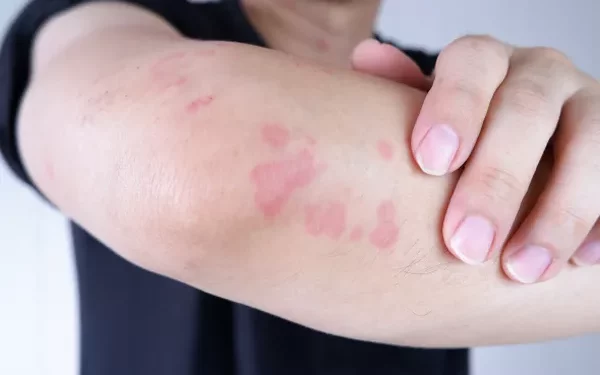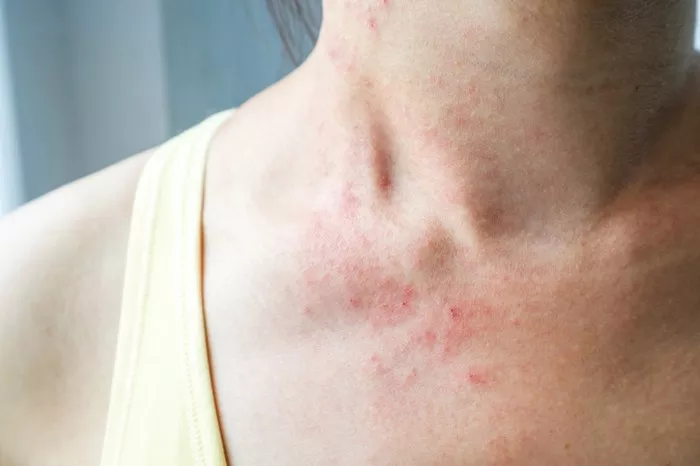Urticaria, also known as hives, is a common skin condition that causes itchy, red welts or bumps to appear on the skin. It can occur suddenly and vary in severity. While urticaria can be triggered by various factors, the good news is that there are several treatments available to relieve the symptoms and manage flare-ups. This article will explore the most effective treatment options for urticaria and help you understand how to best manage the condition.
Understanding Urticaria
Urticaria is a type of skin reaction where the body releases histamine, a chemical involved in allergic responses, causing blood vessels in the skin to leak fluid. This results in the raised, red, and itchy welts that characterize hives. Urticaria can appear suddenly and may last from a few minutes to several hours. In some cases, the welts can persist for longer periods or recur frequently, leading to chronic hives.
Types of Urticaria
There are two primary types of urticaria:
Acute Urticaria: This type of hives lasts for less than six weeks and often occurs after an allergic reaction to food, medication, insect stings, or infections. It usually resolves on its own once the trigger is removed.
Chronic Urticaria: When hives persist for more than six weeks without any obvious trigger, it is classified as chronic urticaria. The cause of chronic urticaria is often unknown, but it may be related to autoimmune disorders or stress.
The Most Effective Treatments for Urticaria
Treating urticaria effectively depends on the severity of the condition, the type of hives, and the underlying causes. Below, we’ll discuss the most commonly used treatments.
Antihistamines
Antihistamines are the first line of treatment for both acute and chronic urticaria. Histamine is the chemical released by the immune system during an allergic reaction, and it causes the skin’s blood vessels to expand and leak fluid, which results in hives. Antihistamines block histamine receptors in the body, helping to prevent or reduce the development of hives.
Non-Sedating Antihistamines: These are the most commonly prescribed type and are typically used for long-term management. They include medications like cetirizine (Zyrtec), loratadine (Claritin), and fexofenadine (Allegra). These drugs are effective at controlling itching and reducing the size and appearance of welts. They are often taken once a day and do not cause drowsiness, making them a popular choice for daily use.
Sedating Antihistamines: Older antihistamines like diphenhydramine (Benadryl) may be used for more severe cases of hives. They are effective at reducing itching and promoting sleep, but they can cause drowsiness, so they are generally recommended for short-term use or during flare-ups at night.
Corticosteroids
Corticosteroids are powerful anti-inflammatory medications that can reduce swelling and inflammation. They are usually prescribed for short-term use in more severe cases of urticaria, especially when antihistamines alone do not provide enough relief.
Oral Steroids: Prednisone is the most commonly prescribed oral corticosteroid for severe or persistent hives. These drugs help to reduce inflammation and manage flare-ups quickly. However, corticosteroids can have significant side effects, especially when used for long periods, so they are typically used only for short durations.
Topical Steroids: For localized areas of hives, topical corticosteroids in the form of creams or ointments can be applied directly to the skin. These provide relief from itching and inflammation without the systemic side effects of oral steroids.
Leukotriene Modifiers
Leukotrienes are chemicals involved in allergic reactions that can contribute to inflammation. Leukotriene modifiers, such as montelukast (Singulair), are used to block the effects of these chemicals. These medications are sometimes used in combination with antihistamines to help manage chronic urticaria, particularly when antihistamines alone are not effective.
Immunosuppressants
For individuals with chronic urticaria that does not respond to traditional treatments, immunosuppressants may be considered. These drugs help to suppress the immune system’s overactive response, reducing the severity of symptoms.
Cyclosporine: This is a potent immunosuppressant used in cases of severe chronic urticaria. It works by suppressing the immune system’s production of certain chemicals that cause inflammation and hives. Cyclosporine is typically used when other treatments fail, and it requires close monitoring due to potential side effects, including kidney problems and high blood pressure.
Omalizumab (Xolair): Omalizumab is a monoclonal antibody that targets IgE, an antibody involved in allergic reactions. It is used for chronic urticaria that has not responded to other treatments. This medication is given as an injection and has shown to be highly effective in controlling symptoms in many patients with chronic hives.
Cold Compresses and Skin Care
While medications are essential for managing urticaria, home remedies can also play an important role in relieving discomfort. Cold compresses can soothe the skin, reduce inflammation, and help calm itching. Applying a cool, damp cloth to the affected area for 15-20 minutes can offer significant relief, especially during flare-ups.
In addition, maintaining a good skincare routine is essential. Use mild, fragrance-free soaps and moisturizers to prevent further irritation. Avoid hot showers, as hot water can make itching worse. Instead, opt for lukewarm water to soothe the skin.
Avoiding Triggers
One of the most effective ways to manage urticaria is by avoiding the triggers that cause it. Although the cause of chronic urticaria is often unclear, acute hives are usually triggered by specific factors such as:
Food allergies: Common allergens include shellfish, nuts, eggs, and dairy products.
Medication reactions: Certain medications, like antibiotics, pain relievers, or nonsteroidal anti-inflammatory drugs (NSAIDs), can trigger hives.
Insect stings or bites: Bees, wasps, or mosquito bites can cause a localized allergic reaction.
Environmental factors: Temperature extremes, pressure on the skin, and sunlight exposure can sometimes trigger hives.
Keeping a detailed diary of your symptoms can help you identify any patterns and potential triggers. If you suspect a particular food or medication is causing your hives, try eliminating it from your diet or consult your healthcare provider.
Managing Stress
In some cases, stress can be a significant trigger for chronic urticaria. Although stress does not directly cause hives, it can worsen symptoms. Managing stress through relaxation techniques, such as deep breathing exercises, yoga, or meditation, can help reduce the frequency and severity of flare-ups.
Diet and Lifestyle Considerations
Although there is no specific diet for urticaria, certain foods and beverages can trigger or worsen symptoms in some people. Common culprits include alcohol, spicy foods, and high-histamine foods like aged cheeses, cured meats, and fermented products. Avoiding these foods during flare-ups may help manage symptoms.
Staying hydrated, getting adequate sleep, and exercising regularly can also improve overall skin health and reduce stress, further helping to manage urticaria.
When to See a Doctor
If your hives persist for more than a few days, or if they are accompanied by other symptoms like difficulty breathing or swelling of the face or throat, you should seek medical attention immediately. These could be signs of a more serious allergic reaction, such as anaphylaxis, which requires prompt treatment.
For chronic or recurrent urticaria, it is essential to consult with a dermatologist or allergist who can help diagnose the underlying cause and develop a personalized treatment plan.
Conclusion
The most effective treatment for urticaria depends on the type, severity, and underlying cause of the condition. Antihistamines are the first line of defense, but for more persistent or severe cases, additional treatments such as corticosteroids, leukotriene modifiers, or immunosuppressants may be necessary. Avoiding known triggers, managing stress, and maintaining a proper skincare routine can also help reduce flare-ups.
By working closely with a healthcare provider, individuals with urticaria can find an effective treatment plan that improves their quality of life and reduces the frequency and intensity of symptoms.
Related topics:



























